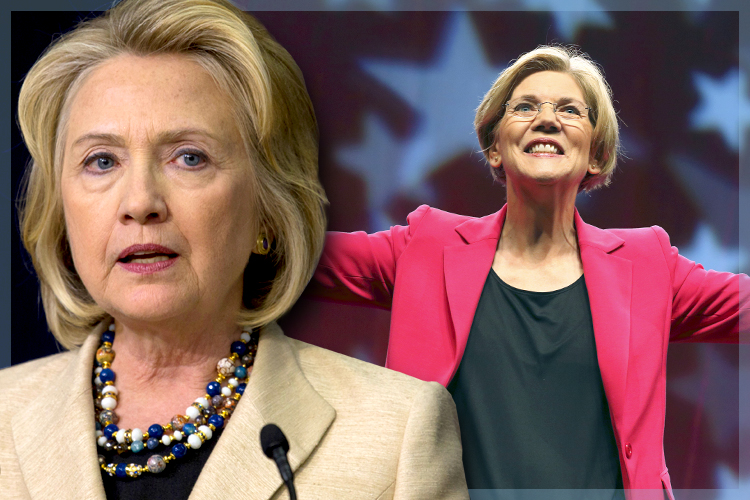 Here’s the question nobody on the left wants to ask: are progressive Democrats poised to go the way of Republican Tea Partiers? That is, exiled to the margins and ignored as the party’s centrists seek to regain power?
Here’s the question nobody on the left wants to ask: are progressive Democrats poised to go the way of Republican Tea Partiers? That is, exiled to the margins and ignored as the party’s centrists seek to regain power?
The front pages of America’s most influential newspapers are touting that the Republican Party’s biggest lesson this year was they realized they had to “crush the enemy,” asThe Times put it, “not Democrats but the rebels within their own party.” And so they did.
Is that what is coming in Democratic Party circles? A resurgence of the so-called Third Wayand Fix The Debt types whose values are more aligned with Wall Street than Main Street? You might hope not, but with the Clintons at the helm as the party soul-searches and looks toward 2016, it’s not so far-fetched, even though Clinton-style centrists lost on Tuesday. Arkansas Sen. Mark Pryor is one example.
Though leading progressives are privately writing, “Good riddance to GOP-lite pols” on listserves, take a hard look at what progressives accomplished in 2014. If you want to be honest, when it came to candidates—not ballot initiatives—they got clobbered. There’s no reason that the corporate centrists who dream of reviving Clintonian good times will be looking left, despite the popularity of Sens. Elizabeth Warren and Bernie Sanders.
Almost all congressional candidates running as working-class Democrats lost this year—most not even winning their primaries. They touted economic messages that progressives know are true—that the nation has growing class divides, worsening inequality, job stagnation and increasingly inadequate safety nets—including Social Security, whose average monthly retirement benefit is akin to a minimum wage job after a lifetime of work.
Everybody knows the political system serves the wealthy, is dominated by a flood of anonymous large donors and needs to be rebalanced. Yet on the anti-corruption front, Larry Lessig’s vaunted multi-million dollar reform effort, the MayDay super PAC, also failed to elect most of its candidates who pledged to push reforms in Congress. Just before the Election Day, Lessig didn’t blog about his team—he said he was finding renewed inspiration in the Edward Snowden movie, Citizenfour.
More seasoned progessive groups used every possible electronic platform to try to engage voters and state the stakes, yet that big effort could not muster enough momentum to carry the day in our “winner-take-all” system. To be fair, they moved the dial, which is significant—but candidate victories were few and far between. There is no growing bench of elected progressives who can counter a likely rightward Hillary drift.
Meanwhile, some of the worst Republican governors are back. Union-busting governors like Scott Walker in Wisconsin and Paul Le Page in Maine won. Corporate tax cutters like Sam Brownback in Kansas, who did what Republicans in Congress dream about, causing a billion-dollar deficit with cuts to every state program including schools, also won. Some of them will be running for president in 2016 and beyond.
Progressives are being written off in the mainstream media’s assessment of what the final two years of President Obama’s term will be like. The Times, for example, said that Republicans expect Obama to reign in his liberal tendencies—if only he had many. If eviscerating civil liberties, dithering on the Keystone XL Pipeline, launching a new war front in the Middle East and adopting the conservative Heritage Foundation’s health insurance reform template is liberal, one can only imagine what’s moderate.
Yet, here is a typical passage from an analysis by The Times’ political correspondent, Jonathan Martin, telegraphing that Democrats might soon exile its left wing:
“The Obama years have in effect represented a political trade-off: Democrats largely abandoned the more centrist, line-blurring approach of Bill Clinton to motivate an ascendant bloc of liberal voters. That strategy twice secured the presidency, but in the two midterm races it meant sacrificing the culturally conservative districts and states that had ensured Democratic congressional majorities.”
Meanwhile, as the post-election jockeying begins, the corporatists are reviving their messaging—calling for responsible leadership and spending cuts, and ignoring issues that are on the minds of progressives and should concern everybody, such as the U.N.’s latest climate change science report that says the industrial world is passing the point of no return with continuing carbon emissions.
Democrats, especally those lined up behind Hillary, will be desperate to find a path back into power. We can hope that they won’t jettison progressives along the way, like the mainstream Republican Party did with its Tea Party wing. But progressives shouldn’t be surprised if that is what unfolds in the near future.

